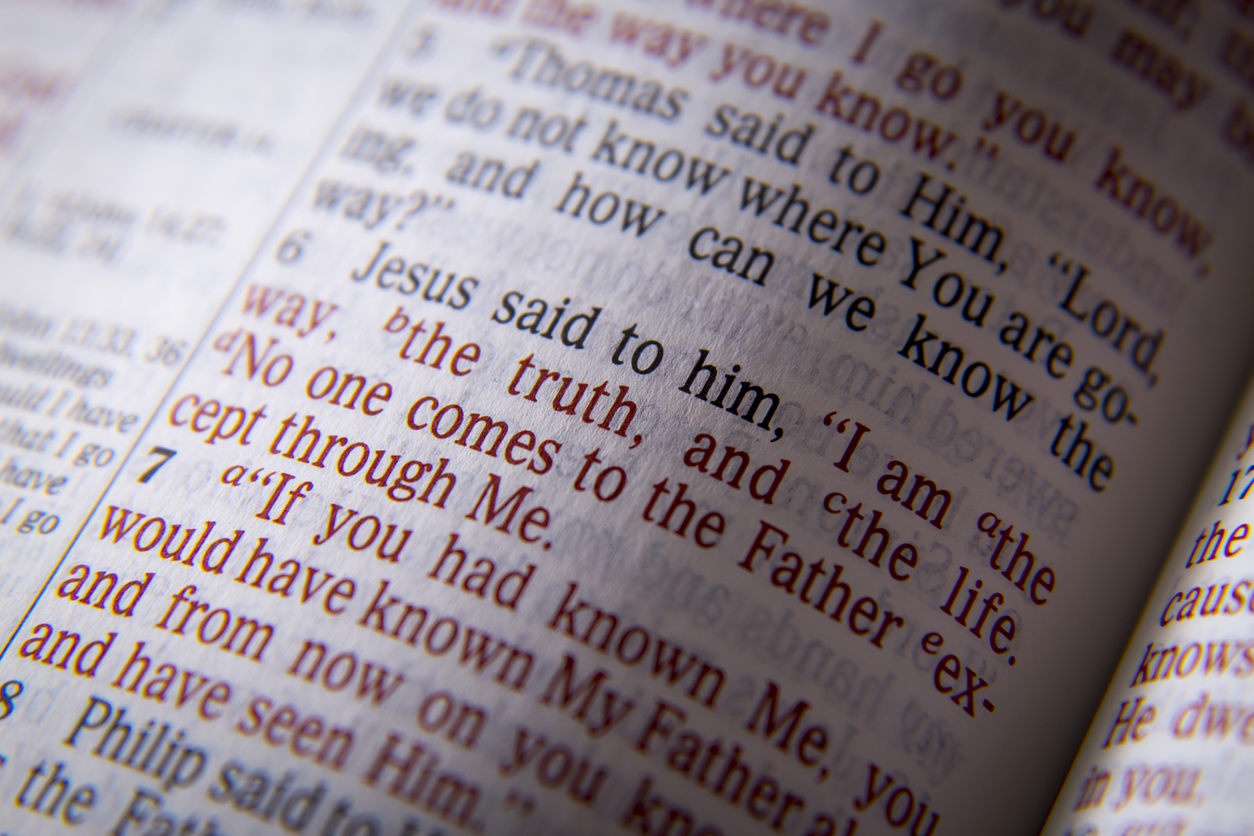It’s been said that there are three sides to every story—your side, my side, and the truth. And if you’ve ever served on a jury, you’ve been tapped to try and decide what the truth is. But there’s a bigger truth—THE truth—that needs to be discussed.
Now, we’re going to dive pretty deep on this one, so please check out my last blog, What is TRUTH? before reading on. I shared some foundational principles about what truth is and isn’t, and you’ll find it helpful as we continue on this discussion.
Truth—It’s Getting a Bad Rap
Truth—it’s abused, belittled, completely made fun of, even marginalized. You might be thinking, “Geez, Pastor Rob, it’s just a concept. You’re acting like it’s a person who got hurt.” Well, that’s because the Bible makes it crystal clear that the truth is a person. Jesus said, in John 14:6, “I am the way, the truth, and the life. No one comes to the Father except through me.” According to this verse, Jesus is the truth.
And the stakes of not getting this right are unimaginably high. No one can get there—heaven—by avoiding the truth. And this is increasingly difficult in a culture that continually undermines the truth.
The Offensive Nature of Truth
When the concept of truth is maligned, it’s usually for one or more of the following reasons.
- Some people say it’s narrow-minded. However, the critic fails to understand that, by nature, truth is narrow. Is a math teacher narrow-minded for holding to the belief that 2 + 2 = 4?
- Another objection to truth is that it is arrogant to claim that one person is right and another person is wrong. However, returning to the above example with mathematics, is it arrogant for a math teacher to insist on only one right answer to an arithmetic problem?
- A third charge against those holding to absolute truth in matters of faith and religion is that such a position excludes people rather than being inclusive. Such a complaint, however, fails to understand that truth, by nature, excludes its opposite. All answers other than 4 are excluded from the reality of what 2 + 2 truly equals.
- Another protest against truth is that it’s offensive and divisive to claim one as truth and someone else’s not. Instead—or better—the critic argues all that really matters is sincerity. The problem with this position is that truth is immune to sincerity. It doesn’t matter how much one sincerely believes the wrong key will fit a door. The key still won’t go into the lock, and the lock won’t be opened.
- Finally, truth is impervious to desire. A person may strongly desire that their car has not run out of gas, but if the gauge says the tank is empty, and the car will not drive any farther, then no desire in the world will miraculously cause the car to keep going.
Popular Worldviews on Truth
The proponents of postmodernism simply affirm no particular truth. The patron saint of postmodernism has to be Friedrich Nietzsche, and he described truth like this. “What that is truth? It’s a mobile army of metaphors, metonyms, and anthropomorphisms. Truth are illusions, coins which have lost their pictures and now matter only as metal, no longer as coins.” Ironically, although the postmodernist holds coins in his hand that are now mere metal, he affirms at least one absolute truth—the truth that no truth should be affirmed. Like the other worldviews, postmodernism is self-defeating and cannot stand up under its own claims.
Another popular worldview is pluralism, which says all truth-claims are equally valid. Of course, that’s impossible. Could two claims, one that a woman is pregnant and another that she is not pregnant, both be true at the same time? No. Pluralism unravels at the feet of the law of non-contradiction, which says that something cannot be both “A” and “non-A” at the same time and in the same sense.

Also, note that pluralism says that is true, and anything opposed to it is false, which is a claim that denies its own foundational tenet. The spirit behind pluralism is an open-armed attitude of tolerance. However, pluralism confuses the idea that all people may be equal, but not all truth-claims are. Pluralism fails to understand the difference between opinion and truth.
Science & the Truth
Some will admit that absolute truth exists but then claim such a stance is only valid in the area of science and not matters of faith and religion. This is a philosophy called logical positivism. In essence, such people say the truth claims must be either: a) tautologies (i.e., all bachelors are unmarried men) or b) empirically verifiable (i.e., testable via science). To the logical positivists, all talk about God is utter nonsense.
Now those who hold to the notion that only science can make truth-claims fail to recognize that there are many realms of truth where science is impotent. It’s absolutely useless. For example, science cannot prove the disciplines of mathematics and logic because it presupposes them. Science cannot prove metaphysical truths, such as minds other than my own even exist. Science is unable to provide truth in the areas of morals and ethics. You cannot use science to prove the Nazis were evil. (They were, but you can’t use science to prove it.) Science is incapable of stating truths about aesthetic positions, such as the beauty of a sunrise or sunset. Lastly, when anyone makes the statement that science is the only source of objective truth, they have just made a philosophical claim, which cannot be tested by science.
And then there are those who say that absolute truth does not apply in the area of morality, yet the response to the question, is it moral to torture and murder an innocent child is absolute and universal. To make it more personal, those who espouse relative truth concerning morals always seem to want their spouse to be absolutely faithful to them.
Truth Is Important
Why is it so important to understand and embrace the concept of absolute truth in all areas of life, including faith and religion? Because life has consequences for being wrong. Giving someone the wrong amount of medicine can kill them. Having an investment manager make the wrong monetary decisions can impoverish a family. The fact is, the truth matters, and nowhere is this more important than in the area of faith and religion. Eternity is an awfully long time to be wrong.
Well, what about God and truth? During the six trials of Jesus, the contrast between the truth—righteousness—and lies—unrighteousness—was unmistakable. There’s Jesus, the truth, being judged by those whose every action was bathed in lies. The Jewish leaders broke nearly every law designed to protect a defendant from wrongful conviction.
They brought everything into this and threw everything against the wall, saying whatever would stick. Pilate quickly detected their superficial deception, and he never even addressed the charge. Jesus, the Righteous, was being judged by the unrighteous. The sad fact is that the latter always persecuted the former. That’s why Cain killed Abel. The link between truth & righteousness and falsehood & unrighteousness is demonstrated by a number of examples in the New Testament. (2 Thessalonians 2:11-12, Romans 1:18, Romans 2:6-8, 1 Corinthians 13:5-6, just to name a few.)
So, what is truth? What’s the conclusion? This question Pontius Pilate asked centuries ago needs to be rephrased in order to be completely accurate. The Roman Governor’s remark, “what is truth,” overlooks the fact that many things can have truth, but only one thing can actually be the truth. Truth must originate from somewhere. The stark reality is that Pilate was looking directly at the origin of all truth on that early morning almost 2000 years ago.
Pilate and the Jewish leaders thought they were judging Christ when, in reality, they were the ones being judged. Moreover, the One they convicted will actually serve as their judge one day, as He will for all who suppress the truth.
Pilate never came to a knowledge of the truth. Eusebius, the historian and bishop in Caesarea, records the fact that Pilate ultimately committed suicide sometime during the reign of Emperor Caligula. It’s a sad ending and a reminder for everyone that ignoring the truth always leads to undesired consequences.
Thanks for sticking with me, as I know this has been a long and tough subject. I can promise you one thing, though: it’s been true.
Come back next time as I tackle another sensitive subject: Black Lives Matter, the optics around BLM, and does it go far enough? Until then, be sure to join me on Sunday mornings—in-person or online—for more life-giving truth at The Summit Church.
~Pastor Rob
Aka, “P-Ro”
